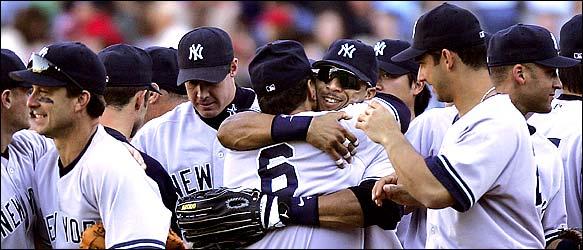Wednesday, September 28, 2005
Wednesday, September 14, 2005
Synopsis of Project 1: Analysis of the Operations of the Tri-City Valley Cats
Analysis of the Operations of the
Overall Impression of Projects Reviewed:
Upon review of all projects, I found lack of attention to detail and lack of objectivity to be the two main reasons why I would not send the memos to Mr. Gladstone, much less any manager of any level.
Instances of lack of attention to detail are as follows:
- Laziness of relying on spell check (e.g., there vs. their, effect vs. affect)
- Poor word choices (e.g., predict vs. estimate, loss vs. lost)
- Not procuring readily available information from the web
- ticket sales are available online (though link not working right)
- detailed directions are available online
- varied theme nights per schedule
- average attendance over 35 games (short season)
- job opportunities (then they would have seen the company is considering photography, on field promotions, video interns and not propose what has already been considered therefore not wasting Mr. Gladstone’s time)
- community involvement
- Incorrect calculations
- basing calculations on a short season
- average ticket sales for all projects were based on total number of seats when they could have taken a little more time
- Ascertained the total number of seats in each price range (i.e., max occupancy)
- Determine the fixed variables (i.e., no. of season tickets, etc…)
- Take the statistical mean of the variables (on-site ticket sales)
- Outrageous and unrealistic figures (both positive and negative)
- Horrendous grammar (e.g., punctuation, sentence structure, etc…)
- Not following directions for the project
- Not following proper and professional memo format
- Some missing subject matter
- Some “signed”
- Overly lengthy and detailed
- One done in a font of 14 for a very blind person, presumably?
- Using familiar first name basis
- Wrong format entirely – one even had appendices!
- Missing titles (e.g., Mr., Dr., CEO, etc…). Note: I would expect these as a formality in an initial memo/contact with a new person/entity – this would be more important in dealing with international clients, particularly the Japanese and European business communities.
Instances of lack of attention to detail are as follows (cont.):
- Not following proper and professional memo format (cont.)
- Using formatted memo templates in which the date is pulled from the computer and is not the actual date (i.e., very dangerous/risky in a real life setting)
- Annoying non-functioning email hyperlinks
- Rambling and inconclusive
- Auto-scaling of text – annoying, annoying, annoying!
- Writing not targeted to audience
- Too informal
- Too condescending
- Incorrectly addressed to wrong person at Tri-City
- Why forecast what customers will buy when you can benchmark off empirical data as derived from previous data sets or comparable set ups?
- Why estimate sales from the concession stands and gift shop? Was this information not easily procurable?
Instances of lack of Objectivity are as follows:
- Identifying, assessing and proposing opportunities based on personal preferences. Very few of the opportunities presented had quantifiable measures to analyze and benchmark from.
- No benchmarking, either from previous years or comparable companies, in any of the projects, therefore resulting in a narrow and limited scope view of the operations.
- “Based on….” ß exact quote from one report. Based on WHAT?
- Three of the projects obviously thought that beer was an issue (either need of or players marketing in a bar….um ok….). Yes, as an owner I want my players to go get drunk and market my franchise/business. Very sophomoric!
- Not taking into account customer expectations and thresholds or perspectives in an objective, measurable manner
- What empirical data supports the contention and numbers for the video games?
- What is the correlation between customer service and customer satisfaction in dollar amounts? Quantifiable? Again, need for benchmarks.
- Area for teens/video games
- Have they considered this might be an attractive nuisance and require additional security and maintenance, clean-up?
- Additional liability?
- Why base a conclusion on a one time event (i.e., hall of fame player = sellout)?
- Novelties – inconsequential???
- Social responsibility?
- Most of the issues/problems were listed (see chart at end of document), however, most were not addressed in a quantifiable manner nor was the solution measurable in any feasible and viable quantifiable method.
Miscellaneous Observations and Comments:
- Poor choice of words, lost nuances
- Poor organization of thoughts, proposal
- Poor presentation of thoughts, proposal
- Purpose of the memo has been missed by most
- CLEAR, CONCISE and TO THE POINT!
- Not to propose but to pique Mr. Gladstone’s attention
- What do they estimate as the number of emails, memos and other forms an average CEO receives in one day that he must respond to, wants to respond to (note the significant difference)? Some of those memos eclipse my epic emails!
- There seemed to be a huge disparity in overall group participation
- It was apparent that certain groups collaborated as their memos were very similar
- Presumptions
- Faulty conclusions
- If a customer is late, he’ll buy less concessions
- If a first time customer has a hard time finding the place, he might not spend as much or return
Key Words/Phrases to Avoid:
- I/We feel….
- ….seems….
- This is why…
- We believe….
- We realize….
- Any subjective words/phrases…
Additional Areas to Expand Upon (by no means exhaustive):
- Tickets
- Pricing
- Promotions of
- Easier online buying
- Advertising
- Updating billboards
- Targeted Advertising
- Concessions
- Inventory control
- Hiring practices
- Work practices (metrics)
- Pricing
- Suppliers and cost
Additional Areas to Expand Upon (by no means exhaustive) (cont.):
- Novelties
- Merchandising
- Inventory
- Pricing
- Suppliers and cost
Conclusion:
Not having attended or listened to any of the key speakers, I have a few comments based solely on our conversations and what I have read. Although some of the groups touched on some of the underlying issues of the organization, none satisfactorily addressed relevant and/or critical operational issues. Additionally, some of the groups touched on feasible and viable opportunities but failed to expand on such, at least in a reasonable and realistic manner. There was no in depth analysis of the organization nor were any of the suggested improvements significantly important enough in financial terms to make it worth the venture of time, energy, effort, resources and, most of all, capital. Particularly disturbing is the lack of benchmarking and trending of the organization against itself, competitors and similar businesses to validate the contentions and solutions. Lastly, subjectivity and personal biases heavily influenced the “analysis” and “proposals”. Given these observations, I recommend that the groups review their notes and additional research be conducted to ascertain if and what business opportunities not already seized are available. It would be interesting to benchmark their current reports against one turned in at the end of the semester. But, here is an interesting proposition, a risky one at that, let the end grade replace the original grade for project 1. If they do better, great. If not, too bad, so sad! Hey, at least it’s better than getting fired!
Graph of Issues as Identified by Groups












